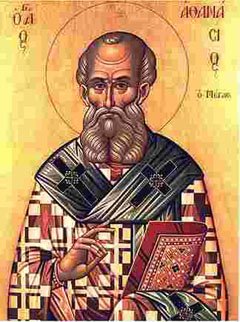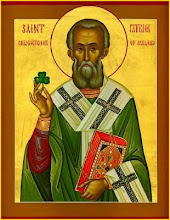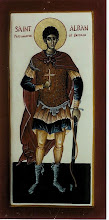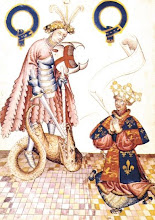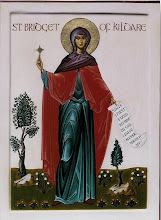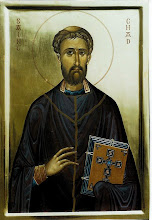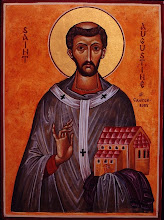I don't know anything about the video, but I have always liked the song and thought I would share.
St. Michael the Archangel
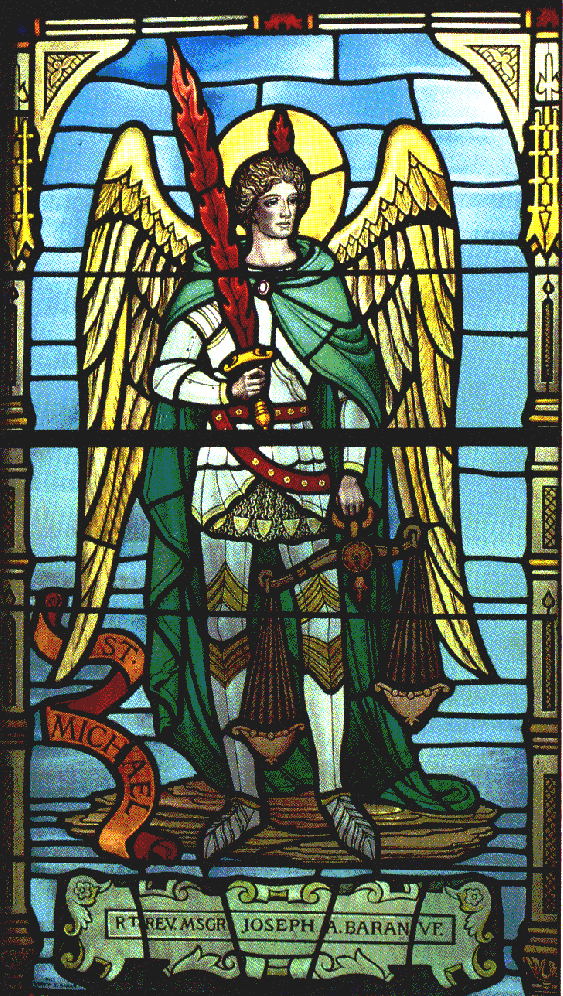
Patron Saint of Police Officers
Thursday, October 8, 2009
Oh, that we all had the courage to praise God with such openness and conviction in our daily lives...
Posted by
Jerry S
at
1:51 AM
5
comments
![]()
Saturday, October 3, 2009
On Salvation, Part III
A recent article on the weblog Creedal Christian by Fr. Bryan Owen, called "Are You Saved?", touched on the issue of salvation from the perspective of an Orthodox Christian, as opposed to that of a neo-Protestant. In his article, Fr. Bryan mentions the consternation felt by many Episcopalians in addressing this all-important question, and I would venture to say that they are not alone in being unsure of how to respond. I would imagine that a majority of catholic Christians have the same problem in meeting such a query with an answer that expresses their beliefs with clarity and love for the asker. For while such a question is usually asked with the intent to cast doubt on the salvation of one who cannot claim a certain date and time, it is usually also done with the intent to bring one to that certain date and time, and is therefore done out of love and charity, however misinformed or misguided.
Fr. Bryan speaks of the "individualism and neo-gnosticism" which seems to pervade modern protestant theology, and I must say that I quite agree with him. Having been reared in a Southern Baptist church myself, I am well aware of this problem in the "ultra-Protestant, Southern Bible-belt." However, while there are several Baptist doctrines with which I have issues, I find myself wondering if they didn't get a few things right. For that matter, is it not possible that, over the centuries, just as the Protestant view has swung as far as possible from the "catholic," the catholic view has attempted to remain catholic by opposing the Protestant to such an extent that something might have been unintentionally lost?
The Orthodox perspective given by Fr. Bryan in his article and the accompanying video is basically summed up by the following:
*I was originally saved over 2,000 years ago...
*I am being saved, daily...
*I will, Lord have mercy, be saved at the great and final judgment.
A reader left a comment which is worthy of noting, and I hope that he does not mind my reproducing it here:
"If salvation is in large part God's work for the world, and the reason for the Incarnation (Jn 3:16), and if God never ceases working (Jn 5:17) and "was, and is, and is to come" (Rev 4:8) then it is entirely fitting that we should experience salvation in this threefold symmetry...."
I want to be unambiguous is stating that I do not disagree with the above summary; however, I wonder if it is complete.
While there are many instances where the Holy Scriptures speak of the ongoing process of salvation, there are also a number of verses in those same Scriptures that speak of that specific moment in time when we "call upon the name of the Lord (Acts 2:21)" and are saved. Rom 10:9,10 says, "because, if you confess with your mouth that Jesus is Lord and believe in your heart that God raised him from the dead, you will be saved. For with the heart one believes and is justified, and with the mouth one confesses and is saved." S. Paul, in his epistle to the Ephesians, said, "In him you also, when you heard the word of truth, the gospel of your salvation, and believed in him, were sealed with the promised Holy Spirit, who is the guarantee of our inheritance until we acquire possession of it, to the praise of his glory. (Eph 1:13,14)" While none of these verses diminish the truth of the ongoing process of salvation, they speak to that definite time of belief to which the Protestant doctrine refers.
While I must believe that salvation is a process that was accomplished on the cross, is being accomplished in the present, and will be accomplished "at the great and final judgment," I must also believe, from the same source, that there must be a "once-for-all change-of-state in the life of an individual," to borrow from another comment, that marks the beginning of that individual's journey of faith. The fact that one is correct does not necessarily mean that the other is not. I want to reiterate a portion of my own comment to Fr. Bryan's article:
"This disparity between the "catholic" and "evangelical" (to coin the common usages) interpretations has often given me trouble in my own journey. I can't help thinking that the answer lies somewhere in the middle [the via media between the catholic and Protestant], being not an either/or proposition, but one of both/and. The two are not mutually exclusive ideas, but necessarily dependent."
I wonder if a more fitting summary of the process of salvation wouldn't be something like the following:
*The price for my salvation was paid over 2,000 years ago...
*I was saved when I believed...
*I am being saved, daily...
*I will, Lord have mercy, be saved at the great and final judgment.
I welcome your comments.
Pax vobiscum,
Jerry
Posted by
Jerry S
at
5:28 AM
2
comments
![]()
Saturday, September 5, 2009
from the pen of Charles Spurgeon...
“Hast thou entered into the springs of the sea?” - Job_38:16
Some things in nature must remain a mystery to the most intelligent and enterprising investigators. Human knowledge has bounds beyond which it cannot pass. Universal knowledge is for God alone. If this be so in the things which are seen and temporal, I may rest assured that it is even more so in matters spiritual and eternal. Why, then, have I been torturing my brain with speculations as to destiny and will, fixed fate, and human responsibility? These deep and dark truths I am no more able to comprehend than to find out the depth which coucheth beneath, from which old ocean draws her watery stores. Why am I so curious to know the reason of my Lord’s providences, the motive of his actions, the design of his visitations? Shall I ever be able to clasp the sun in my fist, and hold the universe in my palm? yet these are as a drop of a bucket compared with the Lord my God. Let me not strive to understand the infinite, but spend my strength in love. What I cannot gain by intellect I can possess by affection, and let that suffice me. I cannot penetrate the heart of the sea, but I can enjoy the healthful breezes which sweep over its bosom, and I can sail over its blue waves with propitious winds. If I could enter the springs of the sea, the feat would serve no useful purpose either to myself or to others, it would not save the sinking bark, or give back the drowned mariner to his weeping wife and children; neither would my solving deep mysteries avail me a single whit, for the least love to God, and the simplest act of obedience to him, are better than the profoundest knowledge. My Lord, I leave the infinite to thee, and pray thee to put far from me such a love for the tree of knowledge as might keep me from the tree of life.
Posted by
Jerry S
at
2:38 AM
0
comments
![]()
